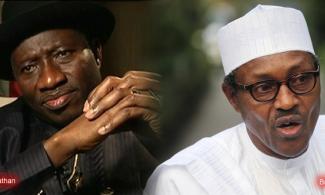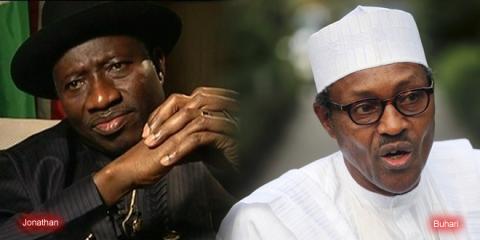
The statement declared that Nigeria enjoyed an “unprecedented 16 years of sustained democratic governance under the PDP, which was characterized by unhindered personal freedom, respect for rule of law and absence of political prisoners, liberalization of the political space, [the] Freedom of Information Act, which gave rise to good and accountable governance, as well as transparent and accountable electoral process which led to credible, free and fair elections in the country.”
The opposition Peoples Democratic Party has declared itself Nigeria’s “only credible national political institution, committed to national interest and the deepening of democratic tenets and ideals in Nigeria.” In addition, the party accused the ruling All Progressives Congress (APC) of running the country in an “increasingly fascist” fashion.

The party’s assertion was contained in a communiqué issued at the end of the party’s one-day special national conference that took place at ThisDay Dome in Abuja on Thursday, November 12th, 2015.
Signed by the PDP’s national secretary, Adewale Oladipo, the communiqué stated that the party inherited a series of problems when it came to power in 1999. According to him, these problems included “an authoritarian polity, a pariah state with a mono-cultural economy heavily dependent on oil, which was selling at the lowest level at the international market, a huge foreign debt overhang, decaying national infrastructure and low national morale.” The communiqué then said the PDP made “selfless contributions” in “the struggle to enthrone democratic governance as well as strengthening the framework for sustainable democracy in the last 16 years.”
The statement declared that Nigeria enjoyed an “unprecedented 16 years of sustained democratic governance under the PDP, which was characterized by unhindered personal freedom, respect for rule of law and absence of political prisoners, liberalization of the political space, [the] Freedom of Information Act, which gave rise to good and accountable governance, as well as transparent and accountable electoral process which led to credible, free and fair elections in the country.”
The communiqué stated that, despite “prevailing difficult circumstances in the country, successive PDP governments at various levels assiduously and effectively implemented progressive people-oriented development policies.” It added that the highlights of these policies included the “development of an institutional framework to fight corruption and corrupt practices in the country,” specifically citing the establishment of the Independent Corrupt Practices Commission (ICPC) and the Economic and Financial Crimes Commission (EFCC).
The PDP also took credit for an “unprecedented revolution in the communication sector, which propelled Nigeria to the 21st century,” negotiating an $18 billion foreign debt write-off, “establishing the Excess Crude Account and Sovereign Wealth Fund for future generations of Nigerians thereby making the future more secure,” “unprecedented infrastructural development in all sectors of the economy,” “the stabilizing [of] the Nigerian banking sector during the period of global economic meltdown when banks in developed economies were collapsing,” “increased access to quality education at all levels to Nigerian youths,” the “enhancement of the capacity of Nigerian farmers through easy access to farming inputs and direct financial support for higher productivity,” the “formulation and implementation of strategic policies which strengthened the national health system as manifested in the increase in life expectancy, decline in maternal and infant mortality and containment of life-threatening diseases such as polio, HIV and AIDS and of course the Ebola virus disease, among others.”
The party also took credit for “growing the Nigerian economy to the status of the largest in Africa and one of the fastest growing in the world.”
Mr. Oladipo, a professor, disclosed that party leaders, including founding members, serving, attended the PDP’s special national conference and former elected and appointed officers, as well as youth and women leaders. According to his statement, the meeting’s objectives included to “take stock of the party’s performance at the 2015 presidential and general elections” and to “reflect on the future of the party with a view to providing better options for the Nigerian electorate.”
He revealed that the theme of the conference was “PDP and the Sustenance of Democratic Ideals In Nigeria.” Among those who made presentations at the conference were Mr. A.B.C. Nwosu, Mrs. Nkoyo Toyo, Mr. Kabiru Tanimu Turaki, and Mr. Dakas J Dakas.
Accusing the APC of being “increasingly fascist,” the PDP restated its commitment “to ensure credible, robust and issue-based opposition while promoting a harmonious relationship among all people and ensuring that citizens’ confidence in the democracy does not wane.” The communiqué added that the party was confident of “a quick PDP rebound,” adding that the conference “called for the immediate implementation of the recommendations of the PDP Post-Election Review Committee Report, especially those relating to zoning, internal democracy, e-registration and the restructuring of the party at all levels with a view to giving the Party back to the rightful owners—the people.”
The PDP deplored “the growing authoritarianism of the APC-led Federal Government which has been characterized by gross violation of human rights, constitutional infractions, invasion of a governor’s lodge and private homes, deliberate interference and instigation of crisis in the legislature, arm-twisting of the judiciary, undermining of democratic institutions like INEC, nepotism in appointments, abuse of power and clamp down on opposition elements.” It also stated that there was a “sudden decline in the economy and quality of life of Nigerians, occasioned by the lack of direction of the APC government, in addition to the growing tension and rancor in the polity as direct consequences of the divisive tendencies of the present administration.”
The party’s communiqué accused the Muhammadu Buhari administration of “selective application in the fight against corruption targeted at opposition elements and perceived opponents of the regime, while APC members with corruption charges are being rewarded with ministerial positions and other juicy appointments as well as APC tickets in the forthcoming governorship elections in Kogi and Bayelsa States.” The statement condemned what it called “the current manipulation of the judiciary and security forces by the APC-led Federal Government in its desperate bid to subvert the sovereign will of the people and forcefully take over states genuinely won by the PDP in the last general elections and ultimately impose a one-party state in Nigeria.”
The PDP urged the new leadership of the Independent National Electoral Commission (INEC) “to assert the independence of the electoral body, resist all external influences and ensure free, fair and credible electoral process in Kogi and Bayelsa States and other future elections,” warning that the PDP would not accept “any results that do not reflect the true wishes and aspirations of the people, particularly in Kogi and Bayelsa States.”
The PDP drew the attention of the international community to the APC-led government’s “growing impunity, abuse of power, constitution infractions, violation of human rights, selective war against corruption, clamp down on the opposition, divisiveness and overall high-handedness, tendencies that pose great threat to our democracy and unity as a nation.”